SWEDISH SOUTH ASIAN STUDIES NETWORK
SASNET visit to Umeå
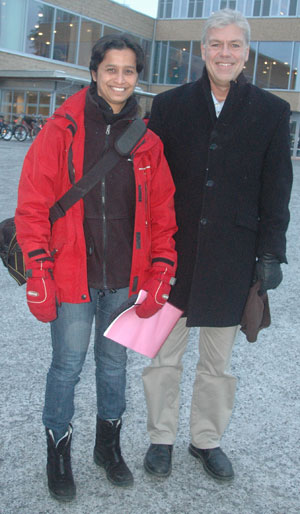 |
| Rupali Bhalerao and Per Nilsson. |
On Wednesday 10 December 2008, SASNET’s deputy director Lars Eklund made a visit to Umeå University and the Swedish University of Agricultural Sciences in Umeå. Lars met with a large number of researchers, university teachers and administrators interested in South Asia related collaboration projects both in research and education, and the possibilities that SASNET might offer in facilitating such. The visit was planned by Dr. Rupali Bhalerao, Coordinator for International Relations and Project Manager for Student Recruitment to International Masters Programs at the Faculty of Science and Technology, University of Umeå; and Ms. Britt-Marie Nordgren, International Coordinator, International Office at Umeå University.
Besides a general seminar meeting to which researchers from many departments had been invited, Lars Eklund visited some of the main departments where South Asia related research and/or education is going on and held separate fruitful meetings with researchers. In the morning, after a brief visit to the International Office and its Head Per A Nilsson, Lars started the round tour of Umeå University by visiting the researchers at the Unit for Epidemiology and Public Health Sciences, Umeå International School of Public Health, before proceeding to meet other representatives for the Faculty of Medicine, and then ended up at the Dept. of Social Work. In the afternoon, after the seminar meeting, he visited Umeå Plant Science Centre (UPSC), run jointly by Umeå University’s Dept. of Forest Genetics and Plant Physiology, and the Swedish University of Agricultural Sciences (SLU) in Umeå.
Epidemiology and Public Health Sciences
A meeting was organised at the section, in the same room as where Krishnammal Jagannathan, one of the 2008 Right Livelihood Award holders, had held a seminar only few days before (more information).
Participants:
• Prof. Stig Wall, Director for the Centre for Global Health
• Senior lecturer Curt Löfgren, Study director of the Master of Public Health Programme
• Dr. Yulia Blomstedt
• PhD Candidate Kjerstin Dahlblom
•
Lecturer Anders Emmelin
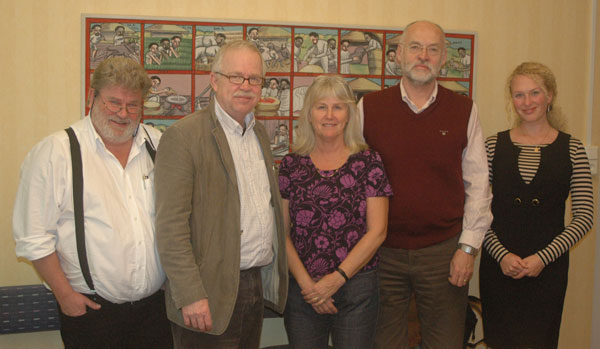 |
| From left to right: Anders Emmelin, Curt Löfgren, Kjerstin Dahlblom, Stig Wall and Yulia Blomstedt. |
Umeå University’s section for
Epidemiology and
Public Health Sciences runs the Swedish Research School for Global Health – a partnership between Umeå University and Karolinska Institutet that has received financial support from the Swedish Research Council. The support provides infrastructure for implementing better and improved research training in global health, focusing on global diseases such as HIV/AIDS, tuberculosis and malaria. In addition, the two partner universities have joint undergraduate and master's programs in global health. Recently both universities have created Centres for Global Health to provide a platform to focus on research on global health, concentrate resources and provide possibilities for making a contribution in reducing global poverty.
From 2009, a new 2-year Master of Public Health Degree has also been launched by the Umeå International School of Public Health. The Masters degree equips public health practitioners and researchers with the skills required to understand, and ultimately help improve and maintain, the health status of the population. A large number of the applicants for the programme will come from South Asia, especially Pakistan, Bangladesh and Sri Lanka. More information.
Regarding research, currently most of the research within the Epidemiology unit focuses on Africa. However, associate professor Lars
Lindholm has been involved in comparative research through the INDEPS network – the Network for Interventions against Maternal-Child Malnutrition
in South Asia, initiated by Prof. Lars Åke Persson, Uppsala University. The network consists of researchers from Umeå, Uppsala and Karolinska Institutet, several researchers in Bangladesh at BRAC and the Centre for Health and Population Research, ICDDR,B in Dhaka, plus international partners. More information about the network.
More information about the South Asia related activities at
the Unit for Epidemiology and Public Health Sciences.
Faculty of Medicine
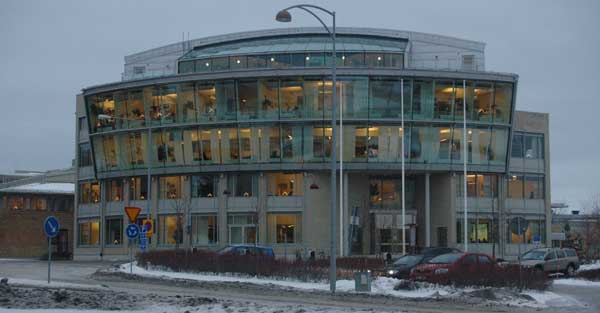 From the Epidemiology section, located in on of the buildings belonging to Norrlands Universitetssjukhus (NUS), I went back to the main University campus, passing the beautifully designed glass building named University Liaison Building (“Samverkanshuset”, photo to the right) where the Vice Chancellor’s office is located, to the main administration building behind.
From the Epidemiology section, located in on of the buildings belonging to Norrlands Universitetssjukhus (NUS), I went back to the main University campus, passing the beautifully designed glass building named University Liaison Building (“Samverkanshuset”, photo to the right) where the Vice Chancellor’s office is located, to the main administration building behind.
I was invited for a meeting with the International Coordinator at the Faculty of Medicine, Ms. Anita Elmquist, in her office.
Professor Leif Gothefors from the section of Pediatrics, Dept. of Clinical Sciences also participated in our meeting that focused on the possibilities to promote increased educational collaboration between Umeå University and medical universities in India.
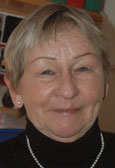 |
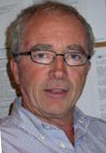 |
| Anita Elmqvist and Leif Gothefors | |
From 2008, the Faculty of Medicine, Umeå University is involved in a Linnaeus Palme collaboration project with St. John’s Medical College at St. John’s National Academy of Health Sciences in Bangalore, India. The question was now raised whether SASNET could play any role to develop this collaboration project.
Leif Gothefors has also many research links to ICCDR,B in Dhaka. In 1975 he defended his PhD thesis, dealing with the anti-infective properties of human milk. Gradually his interests then turned to vaccines and after phase 2 studies of the B-subunit cholera vaccine in Dhaka and early phase 3 studies of a monovalent rotavirus vaccine he established a small unit for vaccine trials (which later has evolved to a unit for clinical studies used also by other colleagues at the department). During the period
1980-81 he was working as a scientist at the ICCDR,B in Dhaka. Later he has been member of the WHO Task force on teaching in medical faculties in developing countries.
Department of Social Work
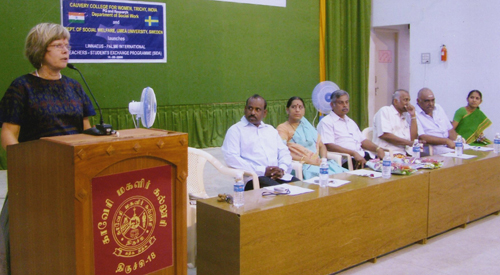 |
| Siv-Inger Bucht holds a speech to her collaboration partners at Cauvery College for Women in Tiruchirapalli. |
The next stop for my visit to Umeå University was the Dept. of Social Work, a department that has been involved in successful educational collaboration projects with India since 2004. Much of the success stems from the efforts and enthusiasm by Dr. Siv-Inger
Bucht, lecturer and international co-ordinator at the department. We met in her office room, and she recounted the story of Umeå University’s collaboration with Cauvery College for Women (CCW) in Tiruchirapalli, Tamil Nadu, India.
It all started in 2003 when a number of social work students approached Siv-Inger and asked her to help them do field studies in Nepal. Since the security situation in Nepal at that time was unstable, instead she searched for optional places to go to in India, and it ended up getting adequate contacts at CCW and its Principal Mr. R. Santhanam and Vice Principal Mrs. S. Sankari.
More information about the Dept. of Social Work and its Indian collaboration
Umeå Plant Science Centre (UPSC)
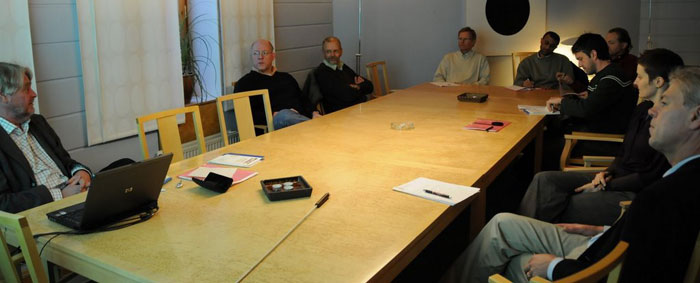 After lunch a meeting was again held in the university’s administration building. Researchers from several departments had been invited to listen to a presentation about SASNET and what possibilities SASNET may offer for Umeå University. Around 10 people turned up for the meeting, mostly from Umeå Plants Science Centre. There was a great interest in promotion of more India and South Asia related research and educational courses at Umeå University and the Faculty of Forest Sciences, Swedish University of Agricultural Sciences (SLU). One of the researchers, Dr. Anders Kastberg from the Dept. of Physics, is also working at Raman Research Institute in Bangalore, India.
After lunch a meeting was again held in the university’s administration building. Researchers from several departments had been invited to listen to a presentation about SASNET and what possibilities SASNET may offer for Umeå University. Around 10 people turned up for the meeting, mostly from Umeå Plants Science Centre. There was a great interest in promotion of more India and South Asia related research and educational courses at Umeå University and the Faculty of Forest Sciences, Swedish University of Agricultural Sciences (SLU). One of the researchers, Dr. Anders Kastberg from the Dept. of Physics, is also working at Raman Research Institute in Bangalore, India.
Other researchers at the meeting were Prof. Petter Gustafsson and Dr. Jan Karlsson from the Dept. of Plant Physiology, Umeå University; Prof. Anders Ericsson, Prof. Gunnar Wingsle and Associate Professor Rishi Bhalerao from the Dept. of Forest Genetics and Plant Physiology, SLU; Guest researcher Jonathan Gilthorpe and Dr. Åsa Gilthorpe from the Umeå Centre for Molecular Medicine (UCMM)
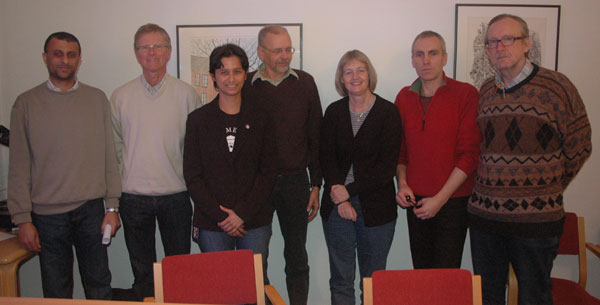 |
| UPSC staff at the meeting with Lars Eklund. From left to right: Rishi Bhalerao, Petter Gustafsson, Rupali Bhalerao, Anders Ericsson, Karin Ljung, Jan Karlsson and Göran Samuelsson. |
The final meeting on the whole-day programme was organised at Umeå Plant Science Centre (UPSC) in the late afternoon. I was accompanied from the Administration building to UPSC (located in Fysiologihuset in another part of Umeå University Campus) by my host for the day Dr. Rupali Bhalerao. Currently she works as coordinator for International Relations at the Faculty of Science and Technology, University of Umeå, but her basic institutional affiliation is actually UPSC.
Seven people turned up for the meeting, out of whom most had already attended my previous presentation on SASNET. The only newcomers to this meeting were Prof. Göran Samuelsson, Dept. of Plant Physiology, Umeå University; and Dr. Karin Ljung, Dept. of Forest Genetics and Plant Physiology, SLU. Therefore the meeting was primarily devoted to information about UPSC and whether SASNET in any way can contribute to promote an extended inclusion of South Asia in its research and educational masters programmes. It was led by Prof. Petter Gustafsson.
UPSC was established in 1999 as a research centre for experimental plant biology with a very special administrative structure since it is based at two departments at two universities, Umeå University’s Department of Plant Physiology (http://www.plantphys.umu.se/), and the Department of Forest Genetics and Plant Physiology (http://www.genfys.slu.se/), based at the Swedish University of Agricultural Sciences (SLU) in Umeå.
The number of employees today at UPSC is more than 170, including 30 to 40 postdocs and more than 35 nationalities are represented. It has got a World reputation, and in February 2005 the Scientist Magazine ranked UPSC (along with Uppsala University) as the World’s best work environment for life science postdocs outside the US.
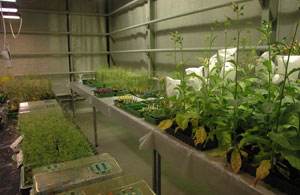 |
| Arabidopsis plants in the UPSC laboratories. |
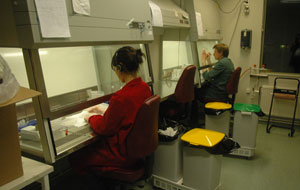 |
| UPSC researchers at work in the labs. |
In 2007, the UPSC Centre for Forest Technology was selected by the Swedish Research Council and VINNOVA to become one of four so-called Berzeli centres of excellence (more information about the Swedish Berzeli centres of excellence). The support amounts to SEK 100 M. for a period of 10 years.
Most of the research at UPSC is concentrated to studies of Poplar trees and the fast-growing plant Arabidopsis (backtrav in Swedish) which has the comparative advantage that is is common all over the world and grows in different climatic zones.
UPSC is considered to be one of the top science centres in Europe, and collaboration projects are ongoing with Max Planck Institute in Munich, the French Institute for Agricultural Research (INRA) in Paris, University of Nottingham in UK, etc. A large group of UPSC researchers are also involved in Woodheads AB, an investment company owned by top scientists in Swedish forest biotechnology. Stockholm University and the Royal Institute of Technology (KTH) are also involved in this innovation project working in close collaboration with private Swedish enterprises.
UPSC has strong ambitions to increase its collaboration with research institutions in South Asia, especially India and Nepal, and get more post-docs from there to go to Umeå. The problem to secure funding and scholarships is however a major obstacle.
UPSC is also involved in organising a Masters programme in Plant and Forest Biotechnology attracting many international students. The education is anchored around the research topics where UPSC researchers are world leading, such as plant developmental biology, forest biotechnology, wood formation and hormone biology. More information ablout the Masters programme.
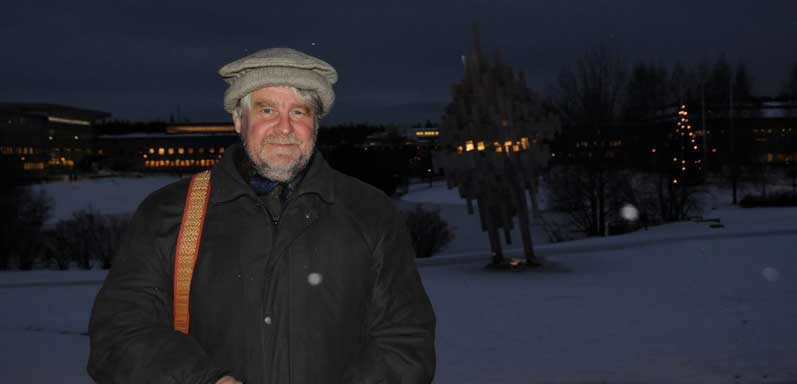
SASNET - Swedish South Asian Studies Network/Lund
University
Address: Scheelevägen 15 D, SE-223 70 Lund, Sweden
Phone: +46 46 222 73 40
Webmaster: Lars Eklund
Last updated
2011-01-19
